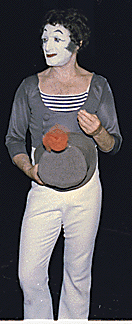 All right, Art Scatter finds it impossible to keep quiet about this.
All right, Art Scatter finds it impossible to keep quiet about this.
This morning’s New York Times reports, via Reuters, that the “art, books and costumes” of Marcel Marceau are to be sold at auction to pay off the great mime’s debts: Apparently Marceau was bankrupt when he died, at age 84, in 2007.
I’m not sure how Marceau managed to lose all his money, although Reuters reports that he “pumped his money into theater productions” — an admirable way to lose a fortune, if you’re going to lose one. (It’s a bit like making wine, an industry where the punchline to the stock set-up “How do you end up with a million bucks in the wine business?” is, “Start out with ten million.”)
Marceau wanted his belongings preserved and his house turned into a cultural center for use by troupes from around the world. For a lot of people, the Paris court’s order to sell the stuff off is an outrage. “A man who for 60 years carried the French flag out into the world deserves to have his legacy and his archives preserved, and not to be dispersed,” Valerie Bochenek, Marceau’s former assistant, told Reuters.
Bochenek and others are trying to raise 100,000 Euros, or about $140,000, before Tuesday’s sale, so they can buy the most important objects and put them in a museum. If you want to, you can donate through:
That would be good. In general Art Scatter approves of making important cultural objects available to everyone instead of having them stuck away in private collections. And Marceau’s story deserves to be told in one place that can bring all its strands together. Here are a few highlights, culled in part from this BBC obituary:
Born in the Alsatian city of Strasbourg and raised in Lille, Marceau was the son of a Jewish butcher who perished in Auschwitz. Marceau joined the French Resistance and, later, the French Army. He studied with the great Etienne Decroux, who also taught Jean-Louis Barrault, star of Marcel Carne‘s classic 1945 movie Les Enfants du Paradis, a film that subverted the Nazi occupation of France and included in its cast many members of the Resistance; the following year Barrault cast Marceau in a stage version of the film, and his career took off. In 1947 Marceau created his iconic character Bip the Clown, who would remain his sweet and astonishing alter ego for the rest of both of their lives.
Yes, this story deserves a museum. But if that doesn’t happen, at least all of us who had the good fortune to see Marceau in performance have the indelible memory of that incredible grace and wit. The magic of his movement is as unforgettable as it is elusive. And I can see in my mind, as I type this, Bip’s battered top hat with its bright red, incurably optimistic flower.
Marceau’s legacy will live on, too, in the lives and art of the thousands of performers he influenced. And who can forget the great joke in Silent Movie, Mel Brooks‘ 1976 comedy, in which the mime Marceau spoke the movie’s only word?
It was a resounding “Non!” — the opposite of the resounding, if silent, “Oui!” that was Marceau’s life.